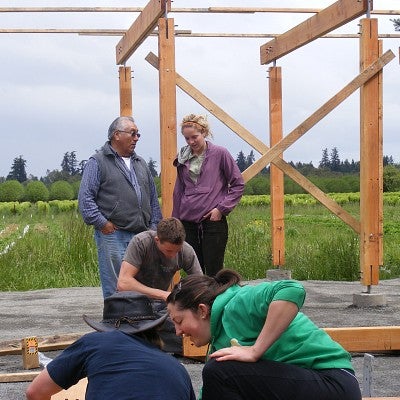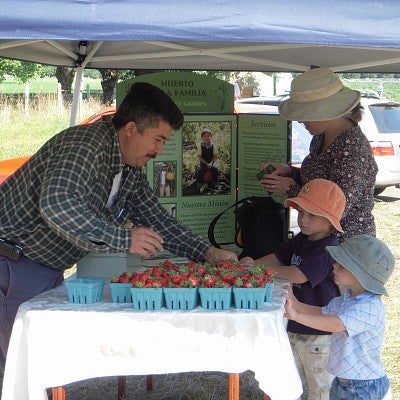June strawberries mark a blessed end to the rainy season. With thoughts of shortcake, smoothies, and homemade jam, soggy Oregon-ians rally on U-pick farms to savor the first taste of summer. For one group of farmers, the U-pick season means blue skies of another sort: a step away from poverty and funds for their kids' educations.
They are members of Huerto de la Familia (the Family Garden), a Eugene-based nonprofit helping local low-income families become economically self-sufficient through organic agriculture. Average families of four seeking the organization's support live on less than $1,500 per month. Unemployment, language barriers, immigration status, and low education levels push them to the margins of society, says Gerardo Sandoval, associate professor in the UO Department of Planning, Public Policy and Management. Many of these families don't have enough food.

Huerto founder and executive director Sarah Cantril '90 first learned of these pressing community needs while working at Centro LatinoAmericano, a nonprofit social service agency that assists immigrants. Later, she worked with new Latina mothers at Eugene's Parenting Now! (formerly Birth to Three). The women Cantril met "needed healthy food but did not qualify for food stamps," she says. In response, she took action, renting a single community garden plot in Eugene's Whiteaker neighborhood in 1999. There, Cantril and six other women grew their own food.
The following year, they tended five plots. In 2004, Cantril turned the co-op into a nonprofit organization and rented more community garden space in West Eugene to accommodate the growing number of families wanting to join. She secured a grant in 2008 from Heifer International (a faith-based charitable organization established to fight hunger and poverty) to launch the Small Farmers Project, a farm-stand business owned by four families who started out as Huerto gardeners. They run the six-acre U-pick strawberry farm on Beacon Drive in Eugene and grow black-cap raspberries for Pacific Northwest restaurants. As per Heifer guidelines, the families invest some of the profits into college funds for their kids. For three years, they sold berries from a tiny folding table set up on the farm.
UO architecture students saw this as inadequate and offered their services. "Huerto needed infrastructure, and we needed a final project," says senior Will Smith, then enrolled in a landscape architecture course focused on site design and construction. The students' primary design objective was to make the building portable, he says, because Huerto farmers don't own the land they till. If the growers had to move, students wanted the structure to go with them. "We had no idea how to do this," Smith admits. Nevertheless, the students proceeded, and with a lofty goal. "We wanted to build an icon of their identity."
When the students presented potential designs to Huerto farmers, confusion ensued. "In class we learned to make glossy presentations to clients," says senior Alex Froehlich, "but we picked up early on that this was not going to work." The farmers lost interest in the students' schematics and instead focused their attention on the 3-D cardboard models, pulling them apart, swapping components around, putting them back together to fashion a final design. "They didn't care about the shape of the roof," Froehlich says. "For them location of the door was important. We didn't think of that."
To build the wood-framed structure, students had to learn how to cut wood and metal and pour a concrete floor. "Our teachers were hands-off, and we had never done this before," Froehlich says. "Over time, we developed a strong relationship with the farmers, so they helped us. Language was not a problem."
I

While the architecture students were pounding nails, another group of students was discussing Huerto's other needs. Renee Irvin, associate professor of planning, public policy and management, was teaching a course in philanthropy in which students researched local nonprofits, visited them, examined their finances, and presented their findings to their classmates. Then, the group voted on the organization that would benefit most from a charitable donation. In 2010, they chose Huerto and awarded it $15,000, a gift made possible by the Oregon-based Faye and Lucille Stewart Foundation. Cantril says the money was "an absolute lifesaver," allowing her to hire a garden project manager.
Filling this position was Joanna Lovera '00, a longtime organic gardener who has worked on the UO's Urban Farm. She now helps 60 families grow corn, chilies, tomatoes, and cilantro by soliciting seed and seedling donations from local farms, arranging compost deliveries to garden sites in Eugene and Springfield, and by working side by side with gardeners.
She's organized countless UO student volunteers from fraternities, sororities, Freshman Interest Groups, the College of Education, the Urban Farm program, the Department of Environmental Studies, the Center for Latino/Latina and Latin American Studies, the International Studies Program, the Survival Center, and the Spanish studies program of the Department of Romance Languages to whack weeds, plant seeds, spread compost, sprinkle fertilizer, and fix rototillers with Huerto families. They helped build a children's garden for Huerto kids to work and play in. Community pride is swelling among those involved with Huerto, Lovera says, because every volunteer further connects low-income Latinos to the UO. "Entire classrooms will come—20, 30, 40 people—to meet the families and garden with them. Speaking Spanish is not necessary."
Keeping Huerto operational is a considerable enterprise requiring grant writers, PR people, and board members. For the past three years, interns have filled these roles, paid with stipends coordinated through the Wayne Morse Center for Law and Politics. "Huerto is an ideal organization to support because it exposes students to nonprofits, deals with issues of migrating families, and supports faculty scholarship," says Morse Center associate director Rebecca Flynn.

As with many of the links between campus and Huerto, support for the films came from many areas. A journalism professor advised Roddy, the theater arts department provided space for interviews, and the Center for Latino/Latina and Latin American Studies donated money to translate the farmers' Spanish into English subtitles.
The films have been shown at private fundraising events and food justice conferences around the United States. Huerto's communications and development coordinator, Joanna Bernstein '12, is collaborating with the Morse Center to promote the films on campus and in Eugene. As Gerardo Sandoval's former student, she became friends with Huerto participants several years ago. Since then, she's witnessed how their gardening success has made them increasingly proud of their culture. There's more to this story than growing food and selling strawberries, she says.
—By Michele Taylor '10, MS '03


